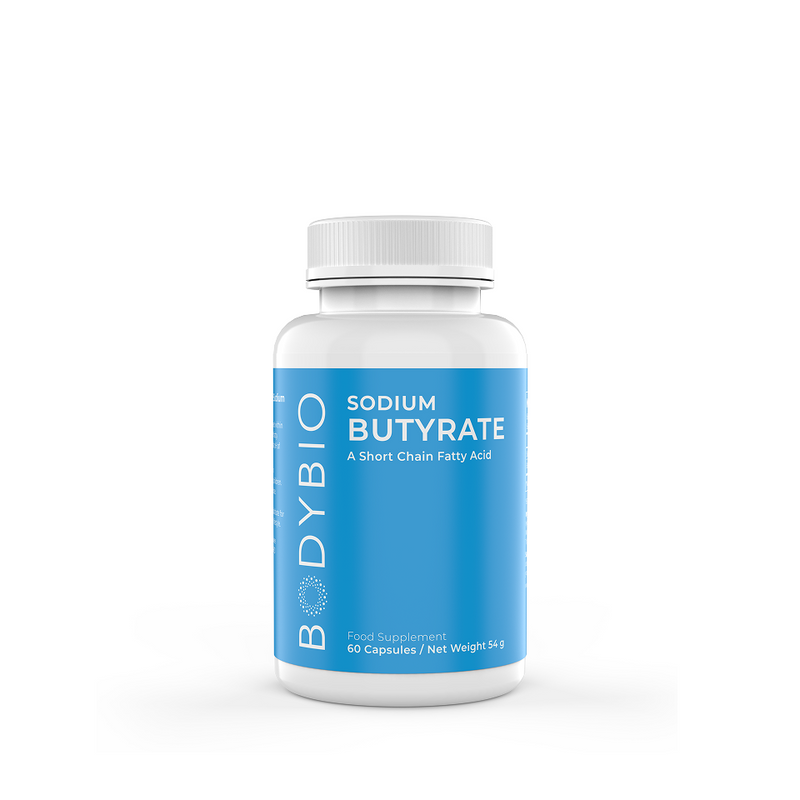10 Benefits of Butyrate for Total Body Health
The benefits of butyrate, a postbiotic short-chain fatty acid produced in the colon, begin in the gut and extend to a host of other important body systems. A key component of the gut microbiome, butyrate has been found to support gut function, hormone regulation, control centers of the brain, and more.*
Here are the top ten reasons why butyrate is widely considered by functional and holistic health professionals to be a foundation of total body health.
Butyrate benefits:
- Fuel the gut lining*
- Support healthy gut permeability*
- Promote a healthy inflammation response in the gut*
- May fight colonic diseases and cancers*
- Promote healthy blood sugar levels*
- Supports normal proliferation of healthy yeast levels*
- Promote cell differentiation*
- Regulate the immune system*
- Combat brain fog and improve sleep*
- Supports healthy blood pressure levels*
1. Fuel the Gut Lining*
Butyrate is produced naturally in the gut when you eat foods that are high in “resistant starch”. Special cells in the gut called colonocytes use butyrate as their primary fuel source. Colonocytes make up the lining of your colon, which helps your body absorb nutrients and protects it from harmful bacteria, yeast, and other pathogens that reside in your gut.
When you don’t eat enough foods consisting of resistant starch, the bacteria in your gut don’t produce enough butyrate, and your gut lining suffers. Carefully increasing your prebiotic dietary fiber (resistant starch) intake and/or supplementing butyrate can nourish the gut lining, help restore healthy nutrient absorption, and more [1]. We discuss butyrate and diet more in-depth here.
2. Support Healthy Gut Permeability*
Your gut lining is the gatekeeper of your large intestine. When your gut lining is healthy, its permeable barrier allows good things such as vitamins and minerals to pass through to your bloodstream, where they travel on to the organs and systems that need them. At the same time, a healthy gut lining must also not allow substances like toxins and pathogens to enter the bloodstream; it keeps them inside so that they can continue on their path towards being removed from the body.
When your gut lining lacks the butyrate “fuel” it needs to maintain healthy gut permeability, toxins and pathogens can slip through. This may cause what is commonly called leaky gut syndrome [2]. Leaky gut syndrome is believed to cause an array of uncomfortable symptoms, including gastrointestinal distress and low energy levels. By keeping the gut lining healthy, butyrate may be a key means of how to heal leaky gut.
3. Promote a Healthy Inflammation Response in the Gut*
The lining of your gut is also responsible for maintaining proper levels of inflammation. When the cells in your immune system fight off invading germs, they produce substances called “free radicals” as part of the process. Free radicals are oxidized, inflammatory substances.
Some inflammation - a very small and controlled amount - helps protect the gut. Chronic inflammation in the gut occurs when your immune system is constantly fighting off what it views to be pathogens. Sometimes, these pathogens are actually invading germs, but sometimes the body overreacts (as with allergies) and fights off substances that are ultimately not harmful.
Regardless, too many free radicals over time can lead to oxidative damage and chronic inflammation. Butyrate prevents the action of inflammatory processes that would normally put stress on our cells by increasing the production of the antioxidant glutathione [3].
4. May Combat Chronic Inflammation, Colonic Diseases, and Cancers*
Chronic inflammation of the gut can cause diseases like IBD (inflammatory bowel disease - the umbrella term for Crohn’s disease and ulcerative colitis) and colorectal cancer down the line.
By neutralizing free radicals, butyrate does more than lowers inflammation: it reduces the risk of immune system reactivity, developing chronic diseases like IBD or colorectal cancer, and more [3].*
While increasing butyrate levels in the colon would help prevent colonic diseases from manifesting in the first place, by strengthening the gut lining, controlling pathogens, lowering inflammation, and modulating the immune system, it may be useful in treating pre-existing colonic conditions as well.* In other words, one of the most exciting prospects of butyrate is its ability to manage and support healthy gut functions for those who already struggle with gastrointestinal issues.*
Butyrate has been shown to modulate the gut microbiome in patients who have inflammatory bowel disease [4].* Research also indicates that butyrate has therapeutic potential for IBD patients, particularly with immunomodulation and mucosal healing [5, 6]. This therapeutic potential is exciting since rates of IBD continue to increase globally and patients are looking for more alternative and complementary treatment solutions [7].
Finally, one of butyrate’s key functions in the gut is to regulate gut motility, how fast or slow food is processed and moves through the colon. Many people with IBS and IBD suffer from either fast motility, diarrhea, or slow motility, and constipation. No matter which type you have, butyrate helps to restore normal colonic motility [8].
5. Promote Healthy Blood Sugar Levels*
Both mice and cell studies show that butyrate has a positive effect on blood sugar balance. Butyrate may increase insulin sensitivity, encourage the body to use stored fat as an energy source, and suppress hunger hormones. Because of these effects, butyrate has been shown to reduce weight gain in mice with “diet-induced obesity,” suggesting that increasing butyrate levels in the gut may also encourage weight loss [X, X, X].
6. Support Healthy Yeast levels*
A study found that sodium butyrate has “significant antifungal activity” on pathogenic yeasts like Candida albicans, Candida parapsilosis, and Cryptococcus neoformans.* Researchers noted that sodium butyrate inhibited the yeasts from spreading and decreased the production of protective biofilms, making them easier to eradicate. Sodium butyrate also enhanced the activity of antifungal drugs, suggesting it might do well as a complementary therapy with medications such as “azole” drugs. [9]
7. Promote Cell Differentiation*
Butyrate promotes cell differentiation, our cells’ ability to change to a specific type like a liver cell or a blood cell. When cells don’t differentiate properly and simply proliferate, we can end up with tumors which then lead to cancer. Butyrate also helps prevent these serious complications by inducing cell apoptosis, the natural death of a cell. [10]
Butyrate is also an HDAC inhibitor.
8. Regulate the Immune System*
Butyrate influences most immune cells, which have receptors to detect it whether in the gut or other parts of the body and bloodstream. Research shows that butyrate upregulates anti-inflammatory immune pathways and downregulates inflammatory ones, even when faced with an inflammation trigger like allergens or toxins.
In your gut, butyrate influences tissues called the gut associated lymphoid tissues, or GALT. The GALT determines the intensity of an immune response based on the microbial balance in the gut. If there are more adverse bacteria or yeasts present, for example, it will launch an attack. This can cause damage and inflammation to the gut tissues over time [12].
Butyrate can modulate the immune system not only by having a direct effect on certain pathogens (like candida overgrowth), but also by fueling the gut tissues, promoting microbial balance in the gut, and lowering inflammation, all of which help the GALT become less reactive.
9. Combat Brain Fog and Improve Sleep*
Butyrate is one of the ultimate players in the gut-brain connection. It increases brain-derived neurotrophic factor (BDNF), a critical metabolite that supports our learning and memory abilities [13]. Butyrate also sequesters ammonia, a toxic byproduct that can cause brain fog.* It may also enhance the brain’s plasticity, the ability to “rewire” new thought pathways, such as when learning a language or changing a habitual behavior. [14, 15]
And here’s the icing on the cake: a study on mice showed that both oral butyrate and intraportal butyrate injection increased non-rapid eye movement sleep by 70% in six hours. It also decreased sleep latency, the time it takes to fall asleep. This is still a new area of research, but the theory is that butyrate may have an effect on sleep-promoting hormones via signaling from the intestinal microbiome [16].
10. Support Healthy Blood Pressure*
Butyrate corresponds inversely to blood pressure, meaning low blood pressure = higher butyrate levels, and higher blood pressure = lower butyrate levels. In a study with 205 participants, researchers found that increasing butyrate production in the microbiome may help regulate blood pressure in obese pregnant women [17]. A 2017 study on rats also showed that sodium butyrate had antihypertensive effects [18].
How to Reap the Benefits of Butyrate
There are three main ways to boost butyrate levels in your microbiome:
1. Increase your intake of foods that already contain butyrate
What foods are high in butyrate? Unfortunately, many of the foods that already contain comparatively large amounts of butyrate, such as butter and some cheeses, are not suitable for consumption in large quantities. However, you can always include them as a balanced part of your diet!
2. Increase your intake of foods that support the microbiome’s creation of butyrate
If you’re looking to increase your butyrate levels via dietary changes, consume foods that are high in fiber, particularly those with high levels of resistant starch. These include:
- Cold rolled oats
- Legumes
- Potatoes (cooked then cooled)
- White rice (cooked then cooled for at least 24 hours)
- Underripe bananas
- Plantain flour
- Whole grains
- Fibrous plant parts such as asparagus ends, broccoli stems, apple skins, etc.
For more information, check out our in-depth resources on butyrate foods and why fiber is important to the body.
3. Butyrate supplementation
Most people find it difficult to eat the recommended 25 grams of fiber a day. Some are sensitive to the types of foods that support butyrate production (typically legumes), while others simply don’t like them (hard asparagus ends and cold potatoes, anyone?). If you are having a hard time integrating butyrate foods into your diet, butyrate supplements can help.
Try BodyBio Butyrate Supplements for Gut & Body Health
When considering all of the supplementation options for your personal health and well-being, it can be overwhelming to try to narrow down just a few—or even just one—key player. While prebiotics, probiotics, and postbiotics all have a place in a well-rounded diet and health-supportive regimen, postbiotics like butyrate have the most therapeutic bang for your buck.
BodyBio’s Butyrate Supplements aren’t just for gut health support, though they exert many benefits there. Butyrate supplements can also promote a healthy brain, immune system, basic cell functions, blood pressure, inflammation, and even your sleep.
Looking for a total body health supplement? Concerned you’re suffering from butyrate deficiency symptoms? Check out BodyBio’s Butyrate Supplements. Try either our Calcium/Magnesium Butyrate and Sodium Butyrate formulations by themselves or as part of our popular Foundation Bundle today!







